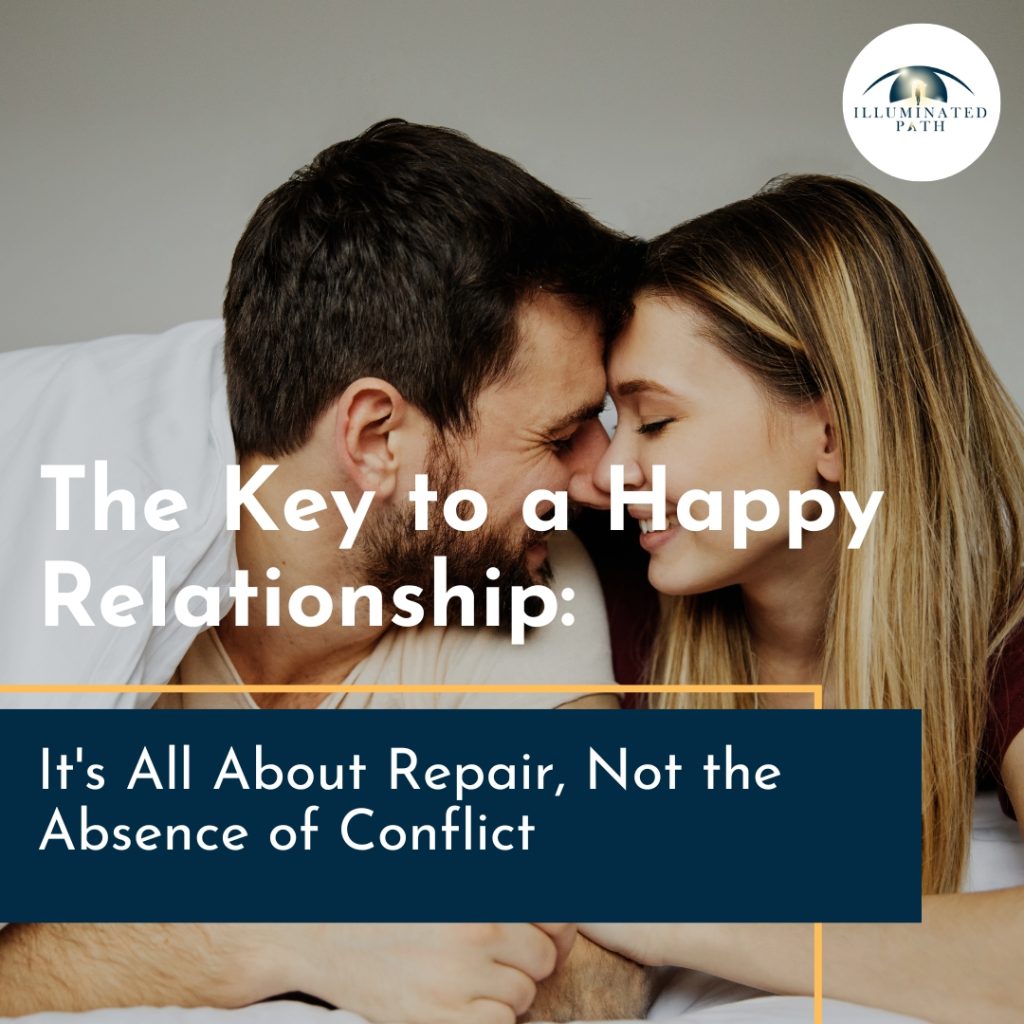The Key to a Happy Relationship: It’s All About Repair, Not the Absence of Conflict

In the world of relationships, conflict is inevitable. Even the happiest couples argue, but what sets thriving relationships apart is how partners handle disagreements. John Gottman, a renowned psychologist and relationship expert, encapsulates this truth with his famous quote: “The key to a happy relationship is not the absence of conflict, but how you repair it.” This idea is more than just philosophical—research backs it up with compelling data. Gottman’s studies, conducted at the University of Washington, have shown that 69% of conflicts in relationships are perpetual problems, stemming from fundamental differences in personality, needs, or preferences. The real test of a relationship isn’t whether couples argue but whether they engage in repair attempts to resolve or manage these differences effectively. The Science of Repair Attempts Gottman’s research also revealed that couples who remain together happily over the long term excel in what he calls “repair attempts”—small actions or communications used to de-escalate tension and reconnect during or after a conflict. These repairs can be as simple as: Apologizing sincerely. Using humor to lighten the mood. Acknowledging the other person’s feelings. Suggesting a break to cool down before resuming the discussion. Couples who succeed in these repair attempts are significantly more likely to report high satisfaction in their relationships. According to Gottman, successful repair attempts predict relationship longevity with over 80% accuracy. Why Repair Matters More Than Harmony The misconception that happy couples never fight can create unrealistic expectations. The truth is that conflict can be healthy—it often signals areas where partners need to grow together. What matters is how couples use conflict to build understanding, intimacy, and trust. Repair attempts are a cornerstone of this process. Dr. Sue Johnson, the founder of Emotionally Focused Therapy, adds another layer to this insight:“Emotional bonds deepen when partners repair emotional injuries and reaffirm their commitment to each other.” This aligns perfectly with Gottman’s findings, emphasizing that the process of repair builds resilience in relationships. Practical Steps for Better Repair Attempts If you want to strengthen your relationship, consider these strategies: Pause and Reflect: Avoid letting emotions drive reactive responses during an argument. Take a moment to breathe and reflect on what your partner might be feeling. Express Vulnerability: A simple “I feel hurt because…” can open a dialogue rather than escalate conflict. Practice Active Listening: Repeat back what your partner says to show you understand, even if you disagree. Use Humor Sparingly: Laughter can be a great repair tool, but only if it feels respectful and well-timed. Revisit the Conflict: Not all issues can be resolved in the heat of the moment. Commit to discussing difficult topics later when both partners are calmer. Final Thoughts Conflict doesn’t have to be the enemy of a healthy relationship. When couples focus on repairing rather than avoiding disagreements, they create a stronger, more resilient bond. Gottman’s work reminds us that it’s not about perfection or harmony but about mutual effort and care. As you navigate your relationship, remember this truth: it’s not the absence of conflict but the presence of repair that determines your happiness together. By mastering repair attempts, you can turn conflict into a tool for connection and growth. The Author Dr. Shadi Souferian Psy. D. Licensed Clinical Psychologist Therapist And Psychologist in Los Angeles And Beverly Hills. You might also enjoy this article: The Key to a Happy Relationship: It’s All About Repair, Not the Absence of Conflict November 21, 2024By:Dr. Shadi Souferian, Psy.DRelationshipStress Management0Comments In the world of relationships, conflict is inevitable. Even the happiest couples argue, but what…Read more Finding Peace in the Present: Letting Go of “Should” and Managing Stress October 28, 2024By:Dr. Shadi Souferian, Psy.DPersonal DevelopmentStress Management0Comments our struggle to accept reality as it is often lies at the root of our…Read more Embracing Imperfection: A Path to Empathy and Acceptance October 17, 2024By:Dr. Shadi Souferian, Psy.DRelationshipCouple RelationshipMarriage0Comments Imperfection is a universal human experience. Yet, many of us strive for unattainable standards of…Read more Relationship Roadblocks? Your Attachment Style Might Be the Key October 10, 2024By:Dr. Shadi Souferian, Psy.DRelationshipCouple RelationshipMarriage0Comments Do you ever find yourself wondering why you react the way you do in relationships?…Read more Is Marriage Counseling Right for Us? Signs It Might Be Time to Seek Help October 4, 2024By:Dr. Shadi Souferian, Psy.DRelationshipCouple RelationshipMarriage0Comments Marriage, a journey filled with love, laughter, and shared dreams, can also be a rollercoaster…Read more Hidden Scars: Unmasking the Impact of Childhood Trauma October 2, 2024By:Dr. Shadi Souferian, Psy.DTraumaChildhoodTrauma0Comments The weight of childhood trauma settles on the soul like an invisible cloak, its presence…Read more
How to Stop the Cycle of Fighting in a Relationship

Fighting is a natural part of any relationship, but when it becomes a recurring pattern, it can take a toll on both partners’ emotional well-being. Constant arguments can erode trust, create distance, and diminish the love that once thrived between two people. However, it’s essential to understand that disagreements can be healthy if managed constructively. In this blog article, we’ll explore effective strategies to break the cycle of fighting and foster a more harmonious and loving relationship. Communicate with Empathy One of the most significant contributors to recurring fights is poor communication. Instead of talking at your partner, try talking with them. Practice active listening and empathetic responses to show that you understand their perspective. Validate their feelings, even if you disagree. When both partners feel heard and understood, it becomes easier to find common ground and work through issues together. Recognize Triggers and Patterns Identify the triggers that lead to conflicts in your relationship. Reflect on past arguments to recognize recurring patterns and the root causes behind them. It could be financial stress, lack of quality time, or unmet emotional needs. Understanding these triggers can help you both take proactive steps to prevent unnecessary conflicts. Pick the Right Time and Place Timing matters when discussing sensitive topics. Avoid bringing up important issues when one or both of you are stressed, tired, or preoccupied. Instead, schedule a time when you can both focus without distractions. Choose a neutral and calm setting to ensure a constructive conversation. Use “I” Statements Practice using “I” statements instead of “you” statements when expressing concerns or grievances. For example, say, “I feel hurt when this happens,” instead of “You always do this.” This approach avoids blame and accusation and fosters a more positive atmosphere for resolving conflicts. Take a Break When Needed If a conversation escalates into an argument, it’s okay to take a break to cool off. Walking away and revisiting the topic later can prevent saying hurtful things in the heat of the moment. Ensure you both agree on resuming the conversation when you’re both calmer and more composed. Seek Professional Help Sometimes, the cycle of fighting may be difficult to break on your own. Seeking the help of a relationship counselor or therapist can provide a neutral space for both partners to express their feelings and work through underlying issues. Professional guidance can equip you with valuable tools and techniques to communicate more effectively. Practice Gratitude and Appreciation Make an effort to express gratitude and appreciation for each other regularly. Focusing on the positives in your relationship can create a more positive emotional climate and reduce the likelihood of arguments. Acknowledging each other’s efforts and strengths reinforces the love and bond between you. Share Responsibilities Equally Imbalance in sharing responsibilities can cause resentment and lead to frequent fights. Strive to distribute household chores, financial responsibilities, and decision-making evenly. When both partners feel they are contributing equally, it fosters a sense of teamwork and cooperation. Prioritize Self-Care Taking care of yourself is essential for a healthy relationship. Make time for activities you enjoy, maintain friendships, and pursue personal goals. When you are emotionally fulfilled as an individual, you bring more positivity and energy to your relationship. Breaking the cycle of fighting in a relationship requires effort, understanding, and open communication. By prioritizing empathy, constructive communication, and mutual respect, you can transform conflicts into opportunities for growth and intimacy. Remember, a strong and loving relationship is built on a foundation of trust, compassion, and a commitment to working through challenges together. Illuminated Path Therapy Whether you are struggling to have the love you want, communicate your needs and desires, or keep falling into disappointing patterns of heartbreak, then it is time to become aware of and heal the underlying issues sabotaging your love life. Individual therapy and coaching for relationship issues can be a powerful tool for reclaiming your life and happiness. You can learn ways to heal past trauma, identify your triggers, and learn effective tools to communicate and get your needs and desires met. A healthy relationship will inspire you to be more of who you are, not require you to give up who you are. Contact us today to schedule an appointment or learn more about how Illuminated Path services can support you. Remember, you don’t have to face this alone. Together, we can embark on a path toward healing and a brighter tomorrow.
